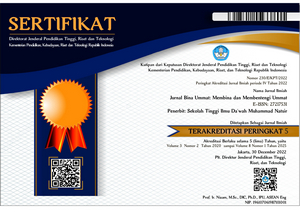URGENSI MANAJEMEN DALAM DA’WAH
Konsep Pengembangan dan Ruang Lingkup Pembahasannya
DOI:
https://doi.org/10.38214/jurnalbinaummatstidnatsir.v3i01.66Keywords:
urgensi da'wah, manajemen da'wah, pengembangan da'wahAbstract
Da'wah activities require regular steps in achieving goals. The various challenges in da'wah cannot be faced sporadically or simply follow the direction of the flow of water. It takes proper efforts to achieve da'wah goals, so that the da'wah can achieve effectiveness and efficiency. For this reason, an answer is needed about the question of how to make this da'wah run well. The answer is the strength of the dakwah management. This research will explain how management knowledge is needed in da'wah. Through a qualitative approach method and literature study, the author will describe the scope of da'wah management needed in achieving da'wah goals, namely; At Takhtith / Planning (Planning), Tanzhim / Organizing, Taujih / Akcutating / Motivating (Direction / Action), and Riqabah / Controling (Supervision). Each with its own techniques and approaches.
Published
Versions
- 2020-09-25 (2)
- 2020-09-25 (1)
Issue
Section
This work is licensed under a Lisensi Creative Commons Atribusi 4.0 Internasional.
Authors who publish with this journal agree to the following terms:
- Authors retain copyright and grant the journal right of first publication with the work simultaneously licensed under a Creative Commons Attribution License that allows others to share the work with an acknowledgment of the work's authorship and initial publication in this journal.
- Authors are able to enter into separate, additional contractual arrangements for the non-exclusive distribution of the journal's published version of the work (e.g., post it to an institutional repository or publish it in a book), with an acknowledgment of its initial publication in this journal.
- Authors are permitted and encouraged to post their work online (e.g., in institutional repositories or on their website) prior to and during the submission process, as it can lead to productive exchanges, as well as earlier and greater citation of published work (See The Effect of Open Access).




